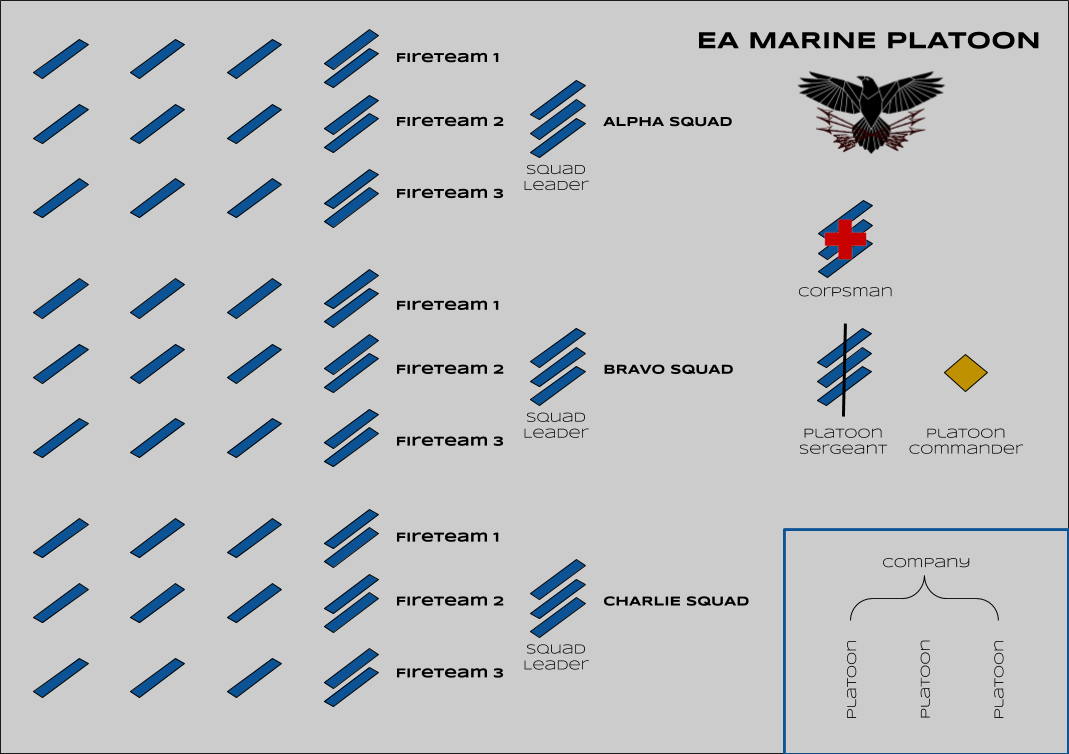They were supposed to be greeted by bombs and bullets as soon as they hit the shore, but what they found instead was something no one could have predicted. With their ship sunk and no rescue crews forthcoming, the only way off the island is to venture deeper into a mystery from the past, a mystery that might have the power to change the whole war. If they can escape, that is.
|
Chapter 1 “All hands: fire on decks four through seven. Port side, forward.” An emergency whistle sounds and the ship’s call is repeated. Hundreds of sailors rush frantically through the passageways, grabbing their firefighting equipment along the way, while dozens others drag the beaten and burned bodies of their shipmates away from the flames. Red lights flash across the bulkheads, creating an ominous aura about the ship that’s only amplified by the smell of burning fuel and the sound of missile launches. “Lukas, grab the FANG!” “Moving!” I hurry over to a rack of weapons and grab a long black rifle, then heave it over to our light assault single-motor boat, enlisting the help of Emma—our team leader—to lock it into the mount at the front. Hundreds of other Marines along the length of the well deck work to prepare their own boats, fighting against time to escape our doomed ship. Another alert clamors over the speakers, bouncing across the bulkheads. “All hands, all hands: provide and equip for abandon ship.” I make one last dash to grab my equipment bag and rifle lying on the deck, then slide back into the boat with the rest of my team. “Go! Go!” Emma shouts to Noah—the newest member of our team—who’s taken the spot at the wheel in the back. Noah coaxes the engine to life, then pulls us away from the sides of the deck and out the back of our amphibious assault ship. As we make our escape, I look back out of morbid curiosity and watch as fingers of flame claw their way out of the port-side hull, while tons of ocean water spill unchallenged into the gaping hole, a mortal wound caused by an untimely missile strike. The entire ship leans perilously to its left side; it can’t be more than minutes from capsizing. The boat bumps along the choppy waves towards San Nicolas Island off the Pacific Panamerican Coast. The assault on Los Angeles is well underway, and even from this distance the fires and flashes from bombs shine brightly on the horizon. Our ship was part of a detachment tasked with securing the Channel Islands, a chain of eight islands guarding the Southern California coast, but as with any operation there are bound to be casualties, and we clearly drew the short stick. We got hit with a long range, shore-fired cruise missile right as we were prepping the landing party, so thankfully most of us Marines were already down in the well deck or en route to the island. I turn my sights away from our dying ship just in time to see the royal blue flag of the European Alliance rip away from the mast and flutter down to the ocean. It’s a disheartening and, honestly, rather embarrassing sight that I never thought I’d see during my time in service. This is probably the first "loss" I've taken since the war began. The ship's horn rings out a chain of short deafening blasts, capped by one final sad blast that lasts for what seems like an eternity—the final call for everyone to abandon ship. The dark shape of San Nicolas Island looms ahead of us, a long, flat silhouette set against the nearly black backdrop of the moonless night sky. If there are any ground troops waiting for us, they're hiding themselves pretty well; there's not even the hint of unnatural light coming from the entire length of the island. Panamericans have never been known to be sneaky, though; their pride doesn't allow it. They're more of the shock-and-awe kind of people. More the Bradburian fireman than a surgeon. "Coming up on Sierra. Range, five hundred," our platoon commander—LT Tuttle, or just Tuttles as we colloquially call him—announces over the communications system, referencing the island's operational code name. "Emma, Collin, get some eyes on the landing zone." "Wilco," Emma replies. She puts down her rifle and rummages around in her bag until she finds a small twin-rotor device, like a tiny handheld-sized helicopter. Then, with a forceful toss, she sends it flying towards San Nicolas, and it lets off a quiet whir as it cuts through the mist. She pulls out a thin, glass monitor from her pocket and watches the footage from the drone as it draws nearer to the island’s shores. There are two panels showing the same image—one in enhanced visual, one in infrared—and another panel to the side with the drone’s manual controls. "Looking clear on South Beach." "Nothing on North." "Good. Doesn't mean there's nothing there. Keep your situational awareness." The boat bumps along with the waves, the only sounds coming from the motor and the fine trail of mist flying behind us. I grip the ropes along the edge of the inflatable craft tightly and smile, despite the situation. I've always loved this part of the job—the salty smell of the sea, the waves sending us nearly over the side of the boat, the adrenaline of waiting to hit the shore and not knowing if someone will shoot back. I wanted to go into the cyber side of things when I first got conscripted, but I thank the stars every day that I got made a Marine. "Range, two hundred. Flares out." There’s a brief pop, then several bright specks fly out from our assault boats towards the island, leaving smoke trails in their wake. A sudden flash overhead, and the entire beach is illuminated in shimmering red. My stomach clenches at the sight; it's the same glowing shade of cardinal that overtook our ship after the missile strike. I move to the front of the boat and ready myself to hit the beach running, my eyes already searching the coastline for the most probable places we’ll take and hold. There are no enemy defenses from what I can see, but they’ve been known to surprise us in the past; the first E.A. troops to hit Virginia’s shores weren’t met with tanks and bunkers, but with mines, booby traps, and backwoods rednecks with their grandpappy’s shotgun. It would have been quite endearing, actually, if they weren’t shooting at us. There’s always been something enchanting about the wild anarchy of the American continent, but as with anything wild, it was meant to be domesticated, civilized. Things that are out of control present too many unknown variables, too many risks. The boat rams itself onto shore, sliding over the ground with a smooth grinding sound, and we leap over the front buffers into the damp sand below. An uncomfortable silence follows us as we rush forward toward a large sandy bank covered by sparse vegetation about three hundred meters in front of us. Some of the other platoons in the company have already made it about halfway up the beach, having landed just before us. I don’t know why, but for some reason it makes me feel somewhat competitive, like I need to be the one that takes the first shot. Other than the beach itself, there are also the broken remnants of a rocky jetty, some rusted scrap metal, and an incredible amount of driftwood and debris scattered about as if a lumber barge washed up here. But nothing else, nothing that would make it seem like anyone had been here recently, in the last few decades, really. I don’t know what it is, but something about this place is throwing me off, making my stomach do anxious flips. “Hey, everyone on me,” Tuttles commands, and I see him charging up an incline that leads to the top of the sand bank. “Dammit, guys!” I turn around and see Lena, our team’s gunner, limping just behind us, her face contorted in agonized fury. Her left pants leg has a giant gash running all the way up it, and even in the murky darkness I can see it’s soaked in her blood. “What the hell happened?” Emma calls out. “I don’t freaking know. Sand gave way and there was something metal beneath.” Emma and I hurry to either side of her, grab her arms, and place them over our shoulders while Noah takes her weapon. “Made it all the way off a sinking ship without a scratch and the first beach you step on…” Emma jokes. “I’m a sea rat, what can I say? I’m not built for land.” Our team is now well behind the rest of the platoon, which has almost reached the top of the sand bank, and it doesn’t help that each step we take is cautiously observant of the next potential sinkhole, or whatever Lena got herself into. Eventually, we make it to where the others have gathered and quickly stagger over to our squad leader, Sergeant Wu, who’s up with Tuttles and the other company leadership gathered by a massive, dilapidated storage tank. “What’s up? I saw you guys drop back,” he questions Emma, leaning away from the group to speak quietly to her. “Lena jacked up her leg. Where’s the corpsman?” “Oh damn,” Sergeant Wu exclaims as he notices Lena’s shredded leg. “You’re just going to have to wrap it the best you can. The corpsmen are back on the boat helping people evacuate.” Emma curses and looks out at the heavy blackness of the night. The ship is no longer visible; either it’s sunk by now, or the flames have dipped below the surface. What’s left of the crew will be on the ship’s lifeboats, which are considerably slower than the Marines’ fast attack boats. It’ll be some time before they reach shore. Tuttles finishes his conversation with the company commander and turns to face the rest of the platoon. “Alright, let’s press!” “Sir, Lena jacked up her leg. We need to assess her condition,” Sergeant Wu says, turning to Tuttles. Tuttles leans around him and looks over at Lena, furrowing his brow with a grimace. “Shoot. Alright, let's have your squad hold back instead of Rafe’s, then. Spread out and hold the beachhead so that the crew has somewhere secure to land when they get here. We’ll move on with the rest of the company and scope out the airbase,” he says, gesturing to the towering inland mesa behind him. “If we face heavy resistance, we’ll need to be able to fall back here so we can defend our foothold on the island. Then, once the other sailors are here, the captain or XO will probably organize a better assault.” He pauses, looking from Lena’s leg to the mesa and back again, a concerned, almost irritated expression carved into his blocky face. “I’m surprised we haven’t seen any resistance yet…I don’t like it.” |

